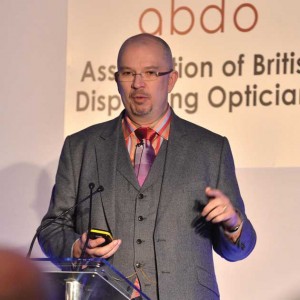 An alternative model for UK optics suggested at this year’s ABDO Conference has arisen from the cost pressures facing optical practices and poor access to eye health services in certain areas of the country.
An alternative model for UK optics suggested at this year’s ABDO Conference has arisen from the cost pressures facing optical practices and poor access to eye health services in certain areas of the country.
While frozen NHS sight fees and competition from free eye tests were devaluing the profession, expensive optical appliances and an abundance of offers were putting off patients. In addition to this, Professor Darren Shickle of Leeds University told delegates at Chesford Grange Hotel, Kenilworth, that the availability of cheap ready-readers and internet spectacle sales were both resulting in patients bypassing full eye exams.
During his presentation, The Future for Optics in the UK – a Perspective of a Critical Friend, he instead proposed a European-style for the profession whereby full eye examinations were separated from the sale of optical goods for the benefit of both dispensing opticians and optometrists.
The professor of public health and head of the Academic Unit of Public Health at the Leeds Institute of Health Sciences said such a separation required several steps that would take some time to achieve. These included an increase to the GOS fee, which according to calculated estimates at the Leeds unit had a true cost closer to £30-40 for a standalone eye test service – around double the present £20.90 fee.
‘If there was a separation between examinations and dispensing the true cost of an eye test would double,’ he said.
Indeed, low reimbursements were leading to some optical practices having to use the sight test as a loss leader and needing to make money back through the sale of products.
‘To make the whole thing work there is a tendency to provide lots of offers to get people in the shop,’ he said. ‘It can be very difficult for people just to make sense of this.’
Optometrists would also need to be subsidised by the NHS to provide eye care in high demand areas and within primary care settings under Professor Shickle’s model. DOs, meanwhile, could then tailor the product they dispensed according to the location of their store.
Together with a shift of eye exams from secondary to primary care, Professor Shickle called for enhanced services to be embedded in the national GOS contract rather than being rolled out locally.
‘We have a very well-trained workforce in the UK, including optometrists, dispensing opticians and ophthalmologists. You are trained to do many things but end up doing some very mundane things,’ he said.
While the current system did not seem to benefit eye care professionals, patients were also missing out. Localised studies by Professor Shickle’s team at Leeds tracked GOS claims by young patients and seniors across different wealth demographics over the space of six weeks.
‘You’d hope people in deprived areas would be more likely to have a sight test than affluent areas,’ he said.
However, it was found that under-16s in deprived areas were 23 per cent less likely to use their free eye test entitlement, while there were 71 per cent fewer claims by patients over the age of 60 in deprived areas, compared to areas classed as affluent.
‘For public eye health professionals this is a tragic turn of events,’ said Professor Shickle.
To capture the older demographic, optical practices should focus their advertising on eye health and use images more representative of the active population, such as outdoor cycling scenes rather than stereotypical care home settings. Recent campaigns by some optical companies were credited with doing this.
Advocating such changes was a priority for the Leeds team. ‘It’s not on the government agenda but we are trying to influence what goes on with NHS England,’ Professor Shickle said.
Day two of the ABDO Conference 2014 revisited the progress of NHS England during an Optical Question Time session.
Panellist Katrina Venerus, LOCSU managing director, said a Call to Action on the future of eye health was planned for this year. ‘NHS England seem more open to working with the profession and stakeholders to move things forward,’ she said.
Questions were also posed about unverified online contact lens sales, including those to children, and the outcome of an ongoing General Optical Council consultation on illegal practice within optics (News 21.02.14) was of interest to ABDO president Peter Black.
Furthermore, a suggestion was made from the floor for optical practices to boycott suppliers to rogue contact lens websites. ‘It is an interesting concept, but we would probably be cutting our nose off to spite our face,’ said Black. ‘The internet is a vexed issue though and nearly impossible to regulate properly.’
On the subject of sight test fees, panellist and AOP chairman Lyndon Taylor added: ‘Until we can get the issue of sight care being subsidised by the sale of spectacles out of the way, we have a problem.’
Therefore, amid the frustration, could calls to separate the eye exam from optical products galvanise high street practices to fight back while allowing optometrists to focus on eye health?
Professor Shickle added: ‘When professions work together they become very powerful. Where do you want to be and how do you plan to get there? The current model is not sustainable, particularly because of the internet. You need to either compete on price or on quality.’
